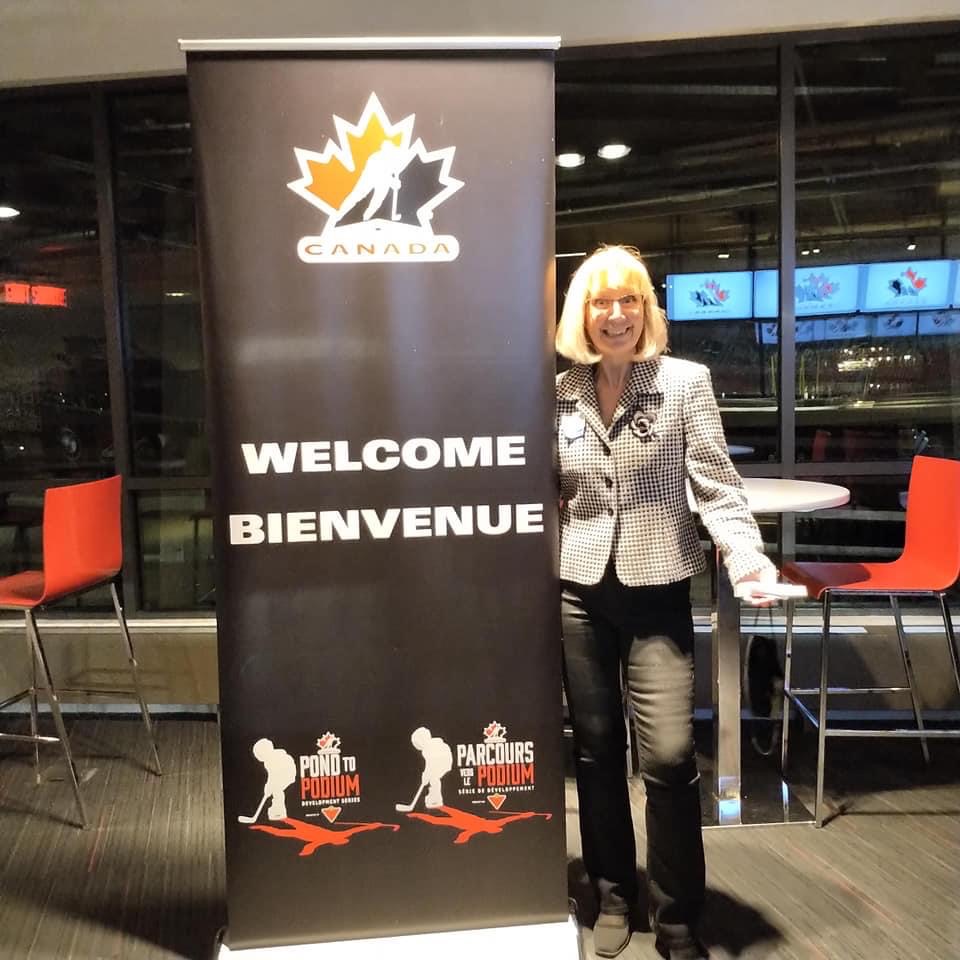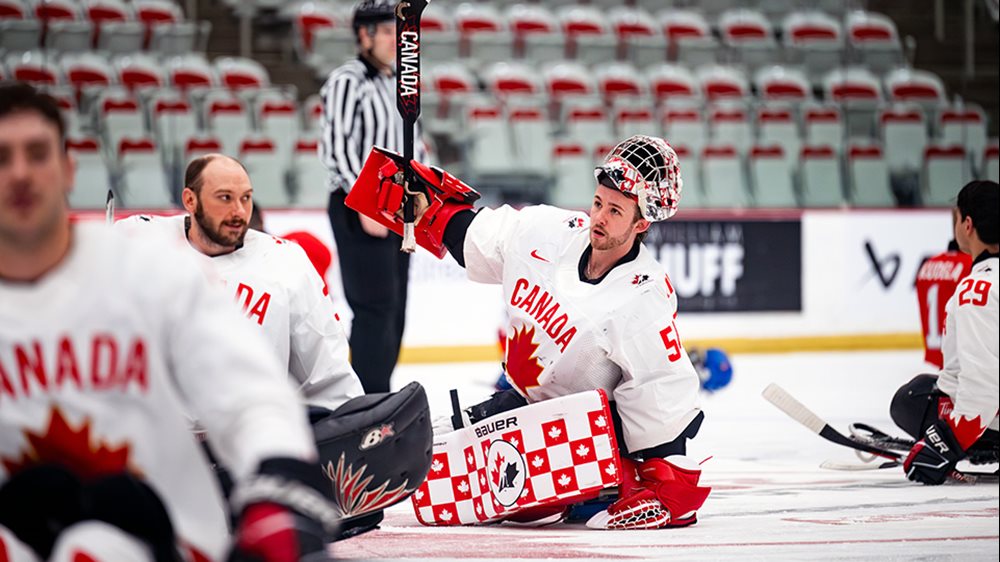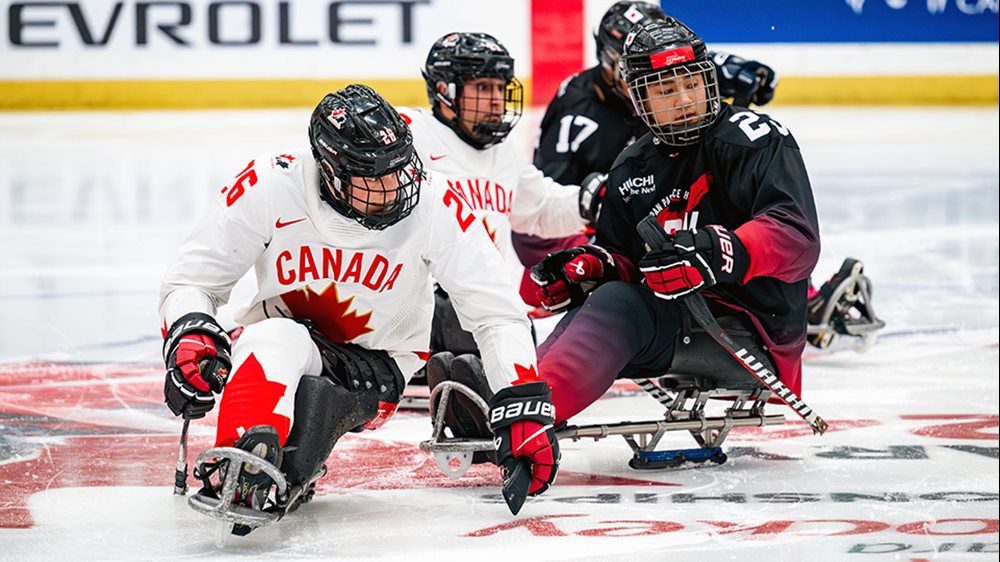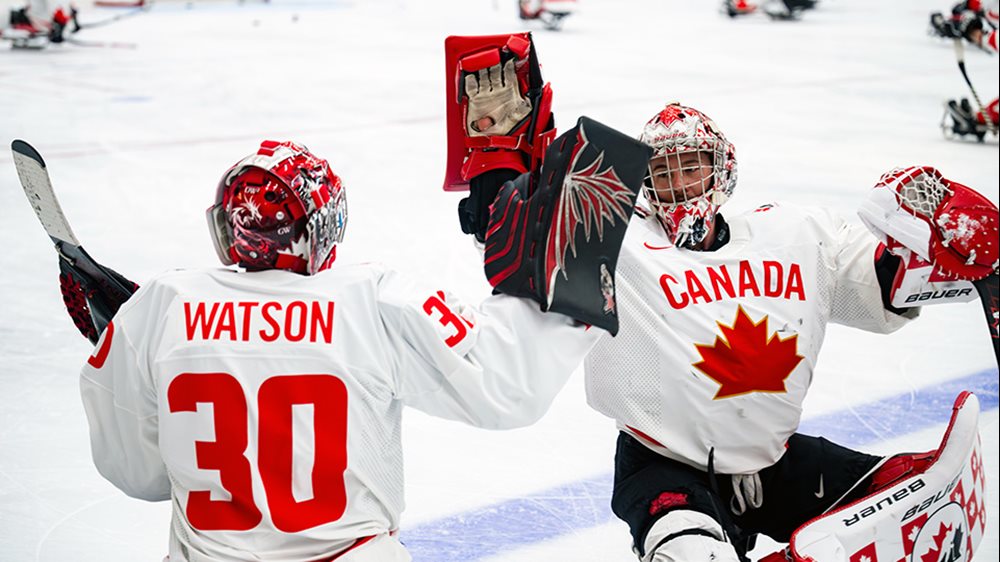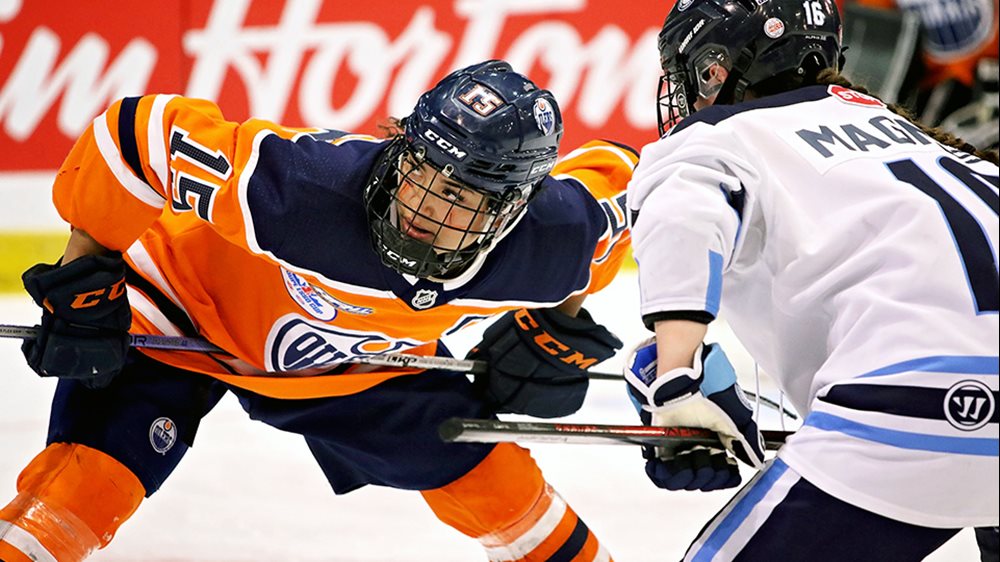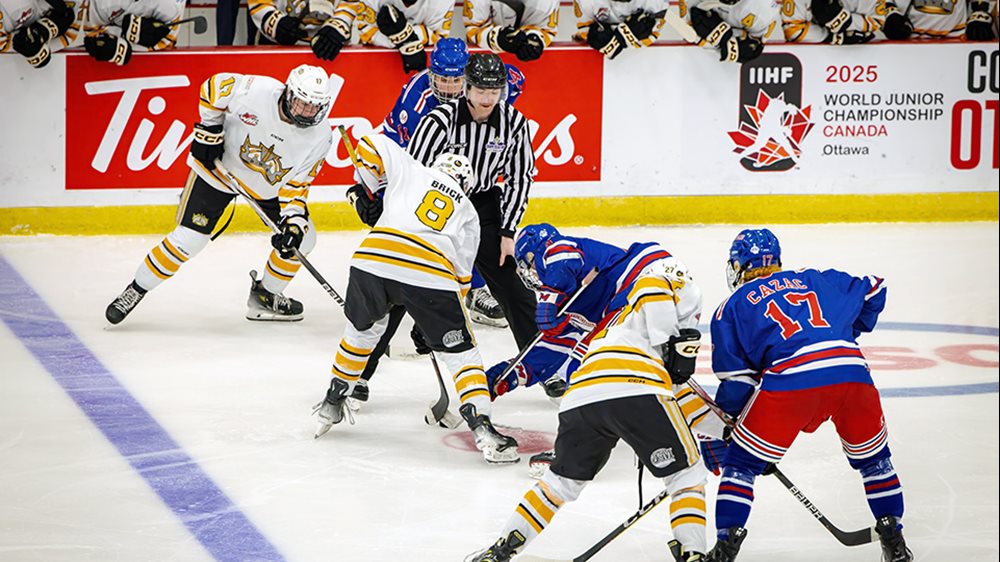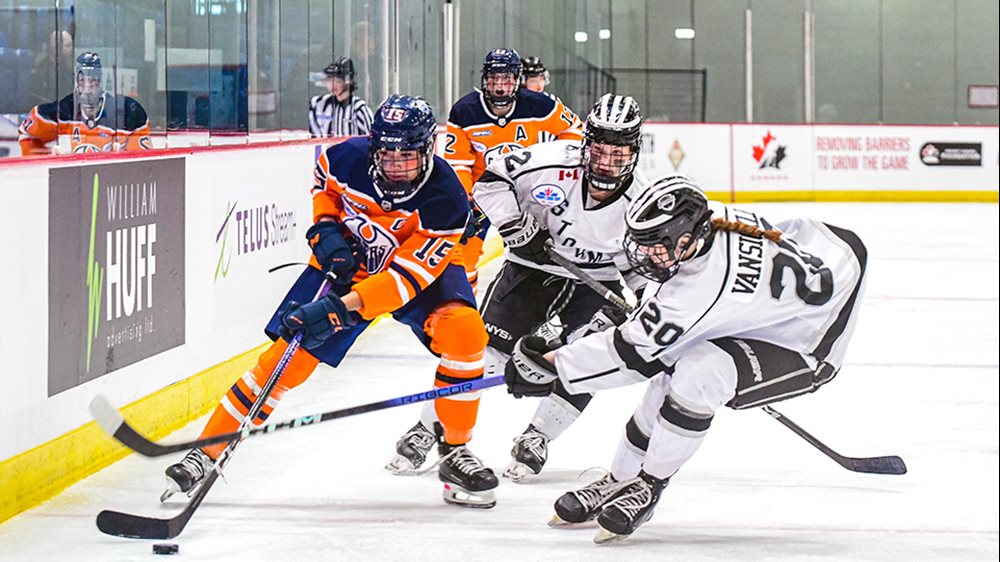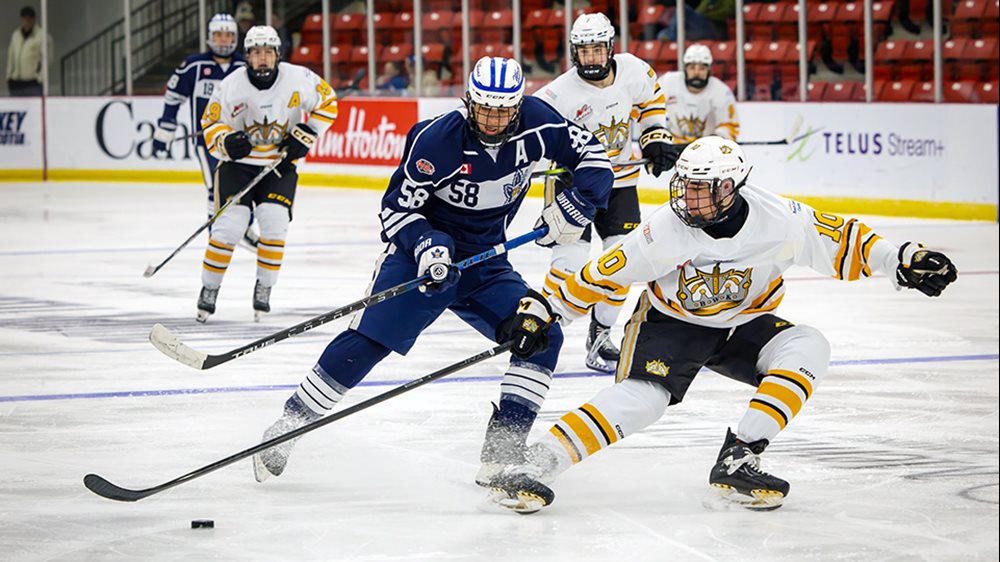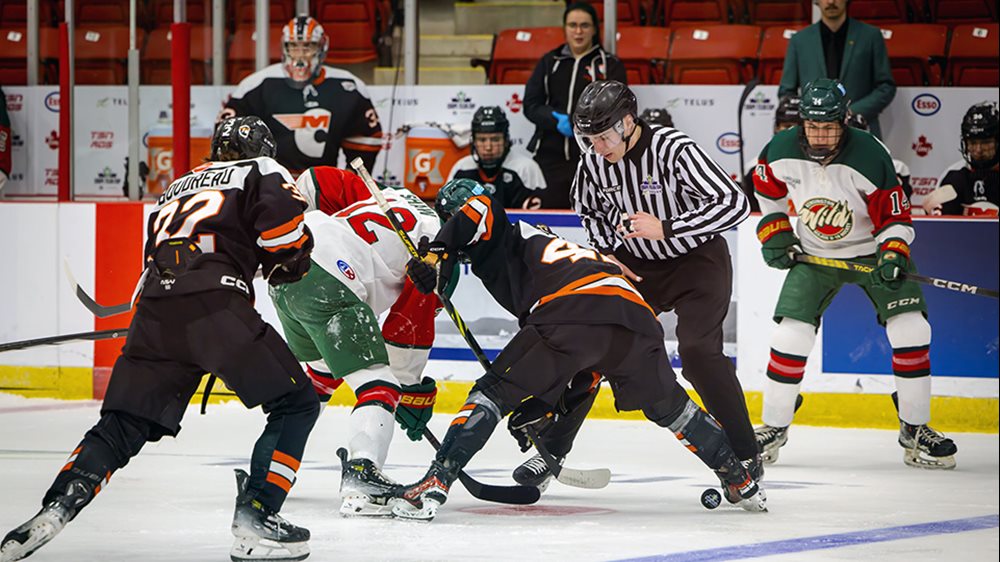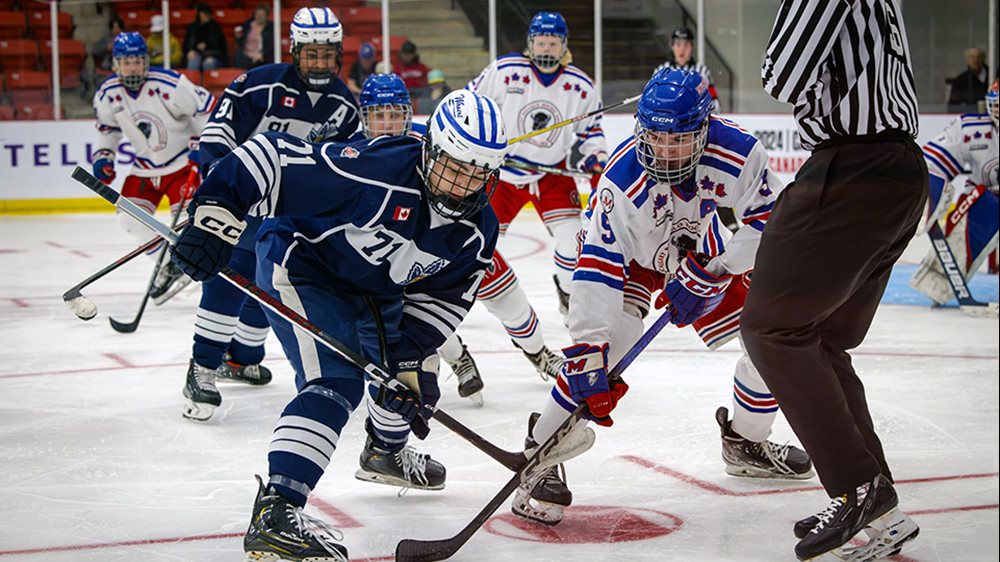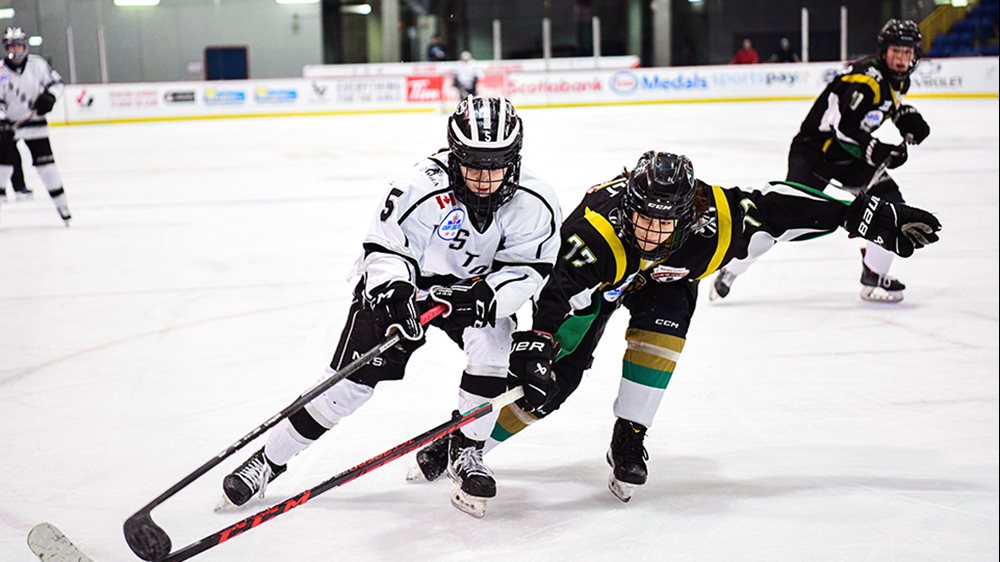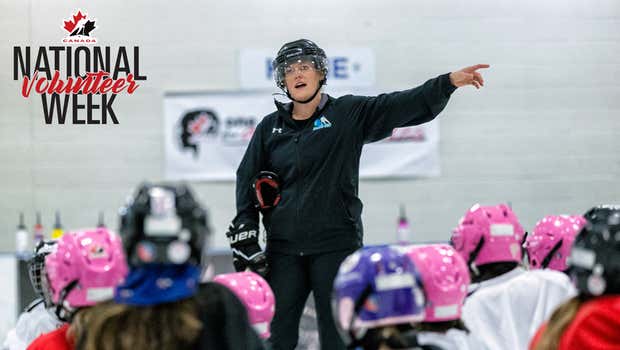
Making an impact in the North
A game-changer in women’s hockey, Kaylee Grant tirelessly gives her time across the territories, volunteering to ensure opportunities exist for women and girls
The first thing Kaylee Grant did when she moved to Yellowknife was find a hockey team.
The operating engineer took a one-year term to gain experience in her industry. Twelve years later, she’s still in the Northwest Territories and hockey has been a reason why she calls it home.
“You gravitate to what you know, and I knew sports,” Grant says. “When you join a sport, you instantly have 17 friends and a group where you feel accepted through a common goal and interest. When I moved to the North, I didn’t know how else to meet friends, so I went to the rink right away.”
Grant grew up around the rink in Antigonish, Nova Scotia. The community was also a hockey hotbed, supporting its Junior A, Junior B and university teams. Being around that passion and community made hockey an important part of her life.
“Playing hockey is what we did,” Grant says. “The community rallied behind our teams and the rinks were full, the atmosphere was great, and hockey was so prominent.”
She played minor hockey in Nova Scotia before moving to Newfoundland and Labrador to play at Memorial University. At 23 years old, she made the move to Yellowknife and knew she would find her community inside a rink.
“I find that the easiest thing to do when you come to a new place to meet people is through sport,” she says. “With joining a hockey team, I was already creating a group of people that were like-minded in interests and similar age. Plus, there are so many opportunities in the North to grow as coaches, players and mentors that have been so helpful.”
Grant’s love for the game wasn’t just as a player—she expanded her knowledge
by getting into coaching while in Nova Scotia. She started as an off-ice
coordinator with the Antigonish Bulldogs women’s under-18 team.
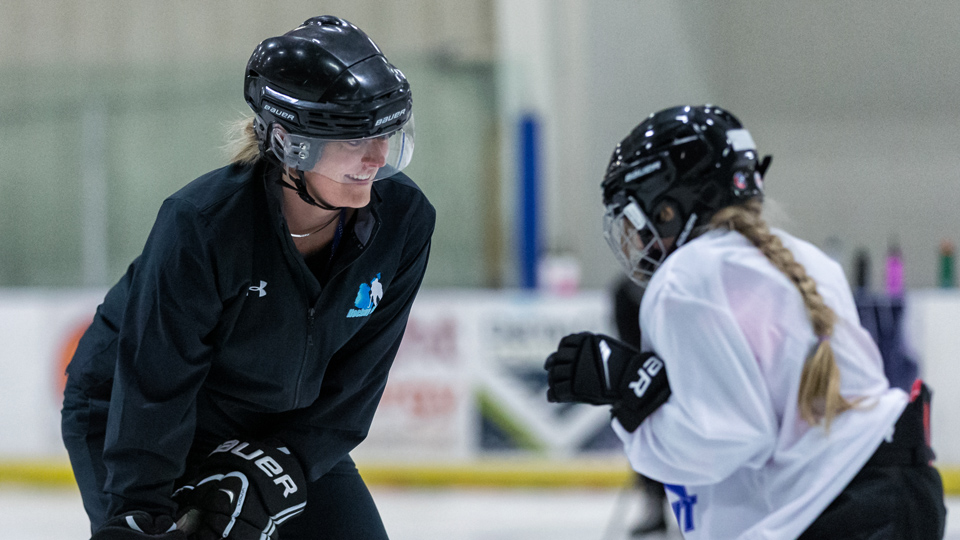
She did her Coach Development 1 training before getting her High Performance 1 training and evaluation certification. She continued to pursue additional coaching certification and training over the years to educate herself and give back to her community.
“I think seeing the female game continuously grow and develop that keeps me interested,” Grant says. “I love to see the progress in my players. I love seeing these players grow and adapt as individuals. Seeing them get involved in coaching is the coolest part.”
Her coaching philosophy is to develop a player’s passion for the game, be a role model and create an environment that is positive for women and girls.
Coaching and mentoring young girls are important to Grant, and she saw that path was through high-level opportunities, particularly by becoming a facilitator to drive more players into the coaching route. She has been working with Hockey North and the Hockey Canada Women Master Coach Developer program, which is focused on removing barriers to coaching education for women.
“Kaylee has volunteered at pretty much every level and she’s getting more involved with training coaches and being a clinician, which is an amazing progression for her,” says Kyle Kugler, executive director of Hockey North and a close friend of Grant. “She’s a great ambassador for hockey by giving back to other coaches through her experiences and helping with their development.”
Through being a volunteer coach, Grant has been able to experience some highlights with her teams, including as head coach for the Arctic Winter Games and Canada Winter Games, and as an assistant coach for Team North at the National Aboriginal Hockey Championship.
“Hockey North has given me so many opportunities and having that support has impacted me as a coach,” Grant says. “I enjoyed every year with those territorial teams and those experiences are a very big reason why I stay here – the coaching opportunities and knowing that we continually have room to grow.”
Another event that Grant was a key volunteer for was the inaugural One For All festival held in Yellowknife in February. It was a four-day event for women and girls from across the N.W.T. and Nunavut that included goaltending clinics, on-ice scrimmages and other off-ice experiences. The event was launched in partnership with Hockey Canada and Hockey North to celebrate the sport and grow grassroots hockey in the North.
“Kaylee is one of our co-leads in the North, and when we set out to deliver this programming in Yellowknife, it was a no-brainer that she would be involved. And typical Kaylee, she just runs with a task and completely owns it,” says Katie Greenway, manager of women’s and girls’ hockey with Hockey Canada. “To have champions like Kaylee that dedicate themselves to their community and sport is so important.”
Giving back through coaching is just what Grant does—it’s like a hobby for her and she does it for others and to see more women in the sport, not for what it could bring to her.
“I’ve known Kaylee for a few years now and she has so much on her plate, but she never says no,” Greenway says. “She doesn’t do it for the accolades, but out of the goodness of her heart with a smile on her face. She’s fantastic and is really impacting everyone that she comes across.”
Grant’s impact on hockey in the North has been felt by many of the girls she has coached, mentored and played with over the past 12 years, but it’s the bigger picture that is most important to her.
“I’m not going to say that myself, individually, has drastically impacted female hockey in the North. I think I am a very small portion of what’s been going on in the North in the last 10 years,” Grant says. “I would like to think that I have helped develop more female coaches and I’ve been a good role model. I think if I have impacted hockey in the North, its pushing players to want to coach a little bit, but it’s a collective—everyone has left their mark on the female game.”
For Kugler, as the lone administrator for Hockey North, having volunteers like Kaylee is so critical to the work and development of hockey players.
“I think volunteers are essential for the delivery of anything in small communities in the North,” he says. “[Kaylee] takes on more than we even realize. Coaches have a huge influence on teams and athletes and she’s a positive role model and advocate for female hockey. She’s selfless with her time and she’s just an awesome person.”
Interested in becoming a coach? Visit HockeyCanada.ca/Coaching, or contact your local hockey association or Hockey Canada Member for more information.
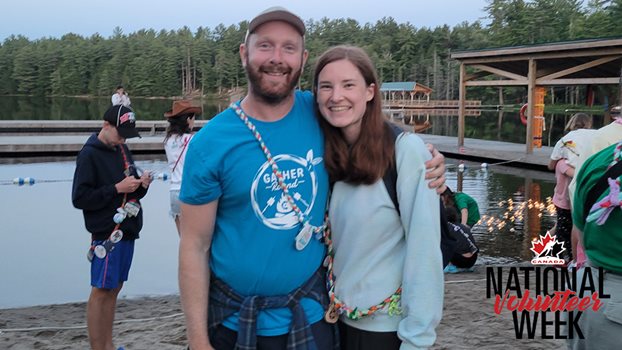
In my own words: Adam Dixon
The Team Canada veteran talks about the summers at Campfire Circle that changed his life, and why he’s still giving back to the camp as a volunteer
Growing up and going to school in Midland, Ontario, I was always The Kid With Cancer.
I mean, it makes sense. Midland is only 17,000 people, and there weren’t many kids who had cancer.
I was diagnosed with Ewing’s sarcoma when I was 10. It’s a rare type of cancer that typically attacks the bones in your legs and pelvis. Mine was in my right tibia. It was removed and replaced with a donor bone, along with a metal plate and multiple screws.
So I was a kid, and I had cancer.
But when I went to Campfire Circle, I was so much more than that.
Campfire Circle is a summer camp for kids with cancer, or those who have been affected by cancer – like kids who have lost siblings. Everybody was The Kid With Cancer, so your other traits got to show through. I was The Athletic Kid, I was The Fun Kid. It was my little two-week escape every summer.
I have no idea how my parents found the camp, I just remember I was signed up and on the bus. And the six summers I spent there changed my life.
At camp, I was able to just be myself. I wasn't the kid that was timekeeping the hockey games because I couldn't play anymore. I was the kid that was involved. I was the kid that was running around, having a good time, doing stuff that my mom would never have allowed me to do at home. But at camp, where there are doctors on site, there's a little bit more freedom. If I break my leg, everything's going to be fine.
The camp is so well set up for people that were in my situation. You could have chemotherapy at camp. It's accessible, so you can do stuff that's not an option for most kids at home.
It’s a breath of fresh air, in more ways than one. The camp is in Muskoka, so you couldn’t ask for a more beautiful place. And just to be outdoors all day, yes please. We'd play road hockey. There's a giant slip and slide. And most of all, it’s just the time spent with your fellow campers pulling pranks on the other campers or the other cabin groups.
Again, it changed my life.
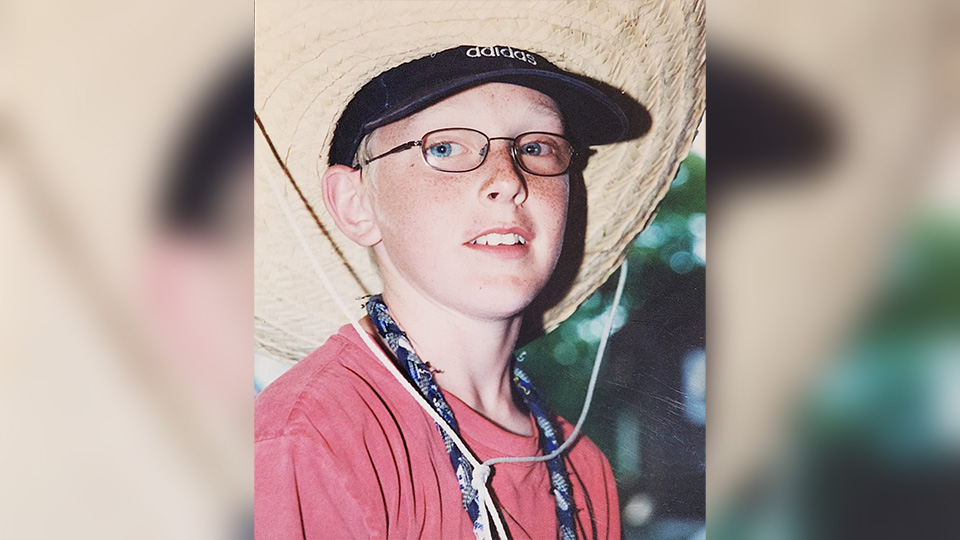
For a lot of years, para hockey was everything. All of my vacation time went to hockey. And I wouldn’t trade that for anything. I’ve been able to travel, win world championships, play at the Paralympics. I’ve spent most of the last two decades wearing the Hockey Canada logo on my chest and representing my country. Amazing.
But after the Paralympics in 2018, I started focusing on other things in my life. And one of those was Campfire Circle. I had signed up to volunteer prior to the COVID-19 pandemic, but the camp was shut down for a few summers because it’s a very vulnerable group.
As soon as we were able to go, I was back. I've been there for two summers now as a full-time volunteer. My partner and I are both volunteers. We've done some weekends at camps as well, which is a fun little way to escape the grind of life.
I was a cabin counsellor my first year and I also ran the wood shop, helping kids stay safe. I can just imagine people I know reading this and laughing… I’m basically a giant kid. Who would trust me with sharp tools?
It was a little daunting at first, but I figured it out. Last summer, they needed someone to help out with a whitewater canoe trip. That's something I've never done before, but they needed someone, so I'm in. Just point and shoot, right? I ended up spending two weeks on the French River. It was outside of my abilities, but we figured it out. This summer I'm back as a cabin counsellor, so I'm just a stay-at-home parent, basically. I just run with the kids all day, so that's pretty fun.
I do have one specific goal for this year, though. My birthday is August 13, so when I was a kid I’d always have my birthday at camp. When you're a camper you get to pick three counsellors to throw in the lake. As a counsellor, I have yet to be cool enough that I get thrown in the lake, so this summer I have to figure out which kids have birthdays and then really pester them so they'll throw me in the lake.
I really want to get chucked in the lake.
One thing I’ve been asked, as someone who is “in charge,” is if there’s pressure on the counsellors. Some people may think that there’s this huge need to make it an unbelievable experience because of what these kids have been through, but it just happens naturally. The kids have fought cancer. That's the worst thing that's probably ever going to happen to them. Going to camp, that's easy. They create their own fun. Some of it is built into the camp atmosphere, sure, but when that thing that makes you “different” at home no longer means as much, you're just yourself and that's pretty cool.
I’ll admit, sometimes volunteering can be a bit selfish. Getting away from society for two weeks is a great little break. I can be silly, I can have fun, I can not be an adult for 14 days. But once I’m there, really, it’s about the kids.
I know how much fun I had when I was 11 years old, and I want to bring that same amount of fun to the campers. I think about when I was a kid and I think about all the counsellors that I really looked up to, and I try to bring a lot of the same energy. Does it work? Who knows, you don't get feedback from the campers. They just make fun of you. But yeah, I think I do a pretty good job.
I’m going to finish with a plea of sorts. Volunteer. Get out and give back. It could be a summer camp. It could be a hockey tournament (I hear the World Juniors are coming back to Canada this winter). It could be anything. It’s about making a difference.
There are so many events around the world that can only run because of volunteers. It's an incredible way to get out and meet like-minded people, people that want to give back to their community.
So why not volunteer? It's awesome. But don’t take my word for it… get out and do it!
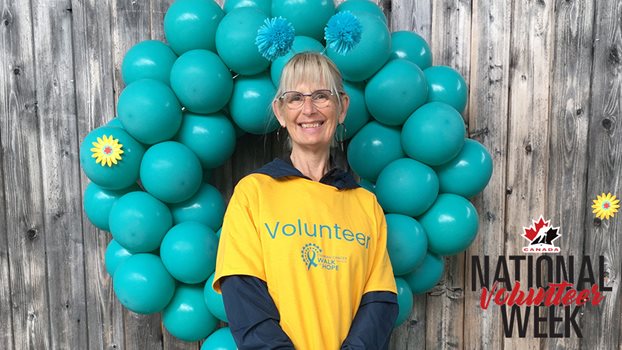
The gratitude for volunteering
After making the choice to begin volunteering to make friends in a new town, Susan Sloan can’t imagine what her life would be like without giving back to her community
Susan Sloan can’t imagine her life without volunteering. In fact, she feels her life would be the complete opposite of what it is now if she hadn’t started donating her time.
Throughout her life, Sloan has had a variety of different jobs, from working in a bakery to an IT specialist and a fitness instructor at the YMCA. After moving to Orleans, Ontario—a community in the east end of Ottawa—in the early 2000s, Sloan took a one-year contact with Volunteer Canada that would change the course of her life.
“I thought since I’m working as their membership manager, I probably should know a little bit more about this volunteering thing,” she says. “But I had already decided that volunteering was the route that I wanted to take, really just to start making friends because I literally had none.”
Her first volunteer position was with Canadian Heritage to help with their Winter Lights Across Canada event. From there, she learned about Winterlude in Ottawa and decided to volunteer for it as well. By then she was on a roll, so she signed up to help with the Canada Day festivities.
“Those were my signature events—every year, with the exception of COVID, you
would find me at all three of those events come hell or high water,” she
says. “That was my core, and they are still my core to this day: 22 years
later, I’m still volunteering with Canadian Heritage.”
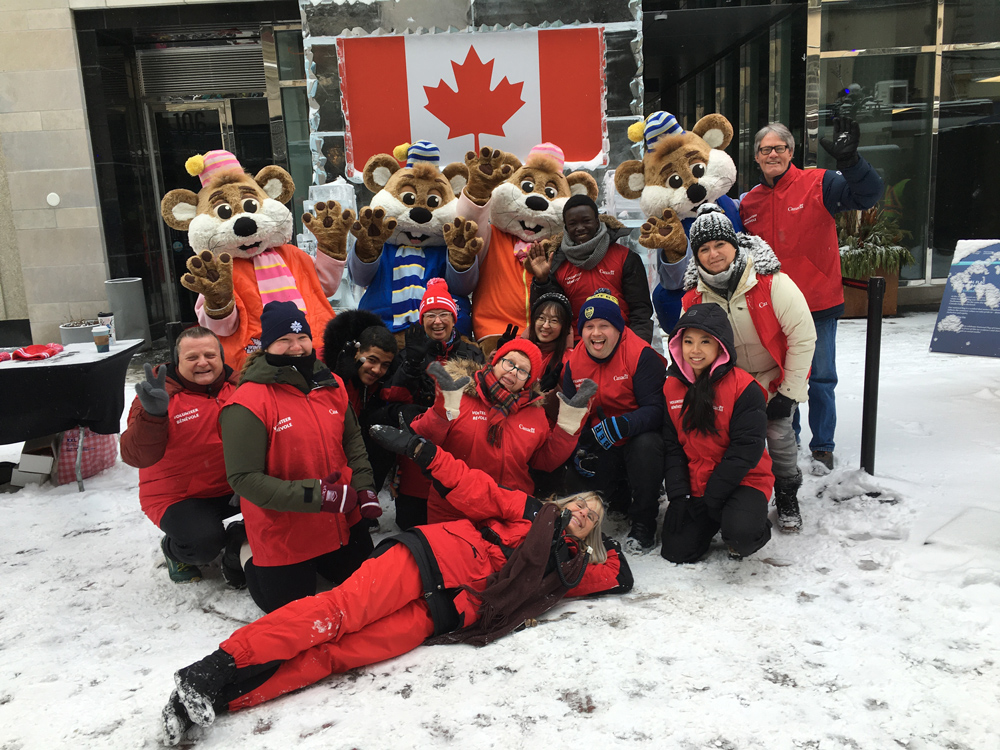
Interspersed between her three core events, Sloan got involved in “little adventures” to explore new volunteer experiences in areas she was interested in.
“I loved sports, so I would pretty much put myself into any event that needed volunteers,” she explains. “In Ottawa, it’s like a laundry list of opportunities; you could be busy every weekend starting on Thursday.”
She began with a volleyball tournament, then taught Zumba at Relay for Life. Soon her volunteer experiences began snowballing into more new opportunities in sports.
“Sports has always been my happy place,” she says. “Being in a small community and in Ottawa, once you are known and you’re affiliated with certain events, you start to get asked to work other events and help out.
“I’ve had some amazing opportunities that I would never have had anything to do with had I not been a volunteer.”
When Canada’s National Women’s Team came to Ottawa in 2021 for the Rivalry Series, Sloan volunteered to help with the Olympic jersey reveal and managed guests coming into the game.
“It was really delightful working with Hockey Canada,” she says. “I really appreciated and respected the respect that we received, and the gratefulness for just doing something that was so minor.”
Later this year, the 2025 IIHF World Junior Championship will be hosted in Ottawa. Through her connections gained from volunteering and her reputation in the community, Sloan was presented with a new opportunity: to become the volunteer co-chair for World Juniors. And coming from a family that loves hockey and watches the tournament every year, she agreed.
“The fact that I was asked to do [World Juniors] … they chose me. That was a
choice and to be that choice is probably one of the most rewarding things in
the world. And none of this would have happened had it not been for
volunteering.”
When the puck drops in December, Sloan is most excited for the tourists and guests to experience what Ottawa has to offer.
“It’s so amazing because as volunteers, you’re in the chaos of everything,” she says. “I love the diversity it brings to the city. It brings a certain energy that the only way you’re going to know what it’s like is if you’re there. It’s amazing to be a part of something.
“People are coming in from all over the world, and you get a chance to mingle with them. You get a chance to show up for your city.”
With her experience in so many volunteer positions, Sloan has a thorough understanding of the value every volunteer brings to the table.
“The synergy that’s created when you are with like-minded people is magical. You have volunteers who, without them, no event would happen,” she says. “IIHF wouldn’t run without their volunteers. Canada Day would not run without its volunteers.”
As her experience allowed her to help others begin their volunteer journeys, Sloan has seen people blossom in ways they never thought was possible. And for Sloan, there are no words to describe the gratitude she has for making the decision to begin volunteering 22 years ago.
“Everything that I am, everything that I will be, is because of volunteering,” she says. “There are not many things in our lives that we put this much effort into that the rewards are amplified upon receipt. I can’t imagine what my life would be like without volunteering.”
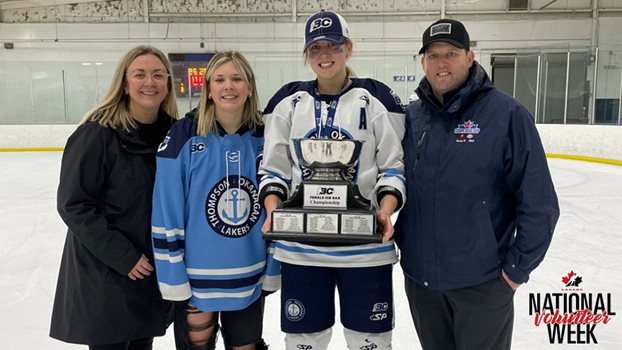
'You’re always fighting for them’
For more than two decades, Braden Robertson has volunteered his time and given financial support to ensure the growth of girls' hockey in Vernon
For more than two decades, Braden Robertson has been a stalwart figure in the Vernon, B.C., hockey community.
Whether it’s been coaching minor hockey, helping his daughter’s hockey team or in his current role as co-chair of the Esso Cup host committee, Robertson has dedicated countless hours giving back to the game he loves.
“I started off playing minor hockey like every other Canadian kid and just evolved from there,” Robertson says about his passion for volunteering.
After his playing days were over, Robertson got involved with coaching teams in the Vernon area in 2001. He took a few years off when his daughters Myah and Hannah were born but got back behind the bench when Hannah began playing hockey.
“Once my daughter started playing hockey, I got back into coaching. Head coach, assistant coach, I did all of that for quite a while,” Robertson says.
However, as Hannah, who will participate in the 2024 Esso Cup with the Thompson-Okanagan Lakers, grew older and began playing at a higher level, Robertson took a step back from coaching. He instead found other ways to stay involved, working to help secure sponsorships for the Lakers over the past couple of seasons.
“When your kids get older and they play at a higher level, they have higher coaching, more than my experience,” Robertson says. “You’ve always been a part of the game, and now you’re like ‘Where can I fit in, how can I help out?’ and that’s my part, helping out wherever is needed.”
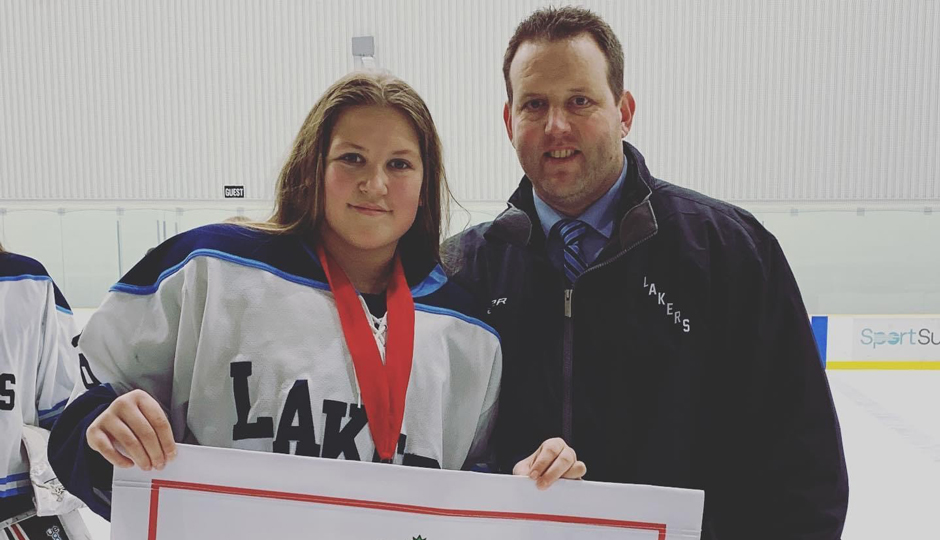 And that’s exactly what he’s done. This past summer, Roberston built a dressing room for the Lakers inside Kal Tire Place. A business owner and contractor by trade, Robertson covered the majority of the construction costs — close to $7,000 — and secured sponsorship funding to cover whatever was outstanding.
And that’s exactly what he’s done. This past summer, Roberston built a dressing room for the Lakers inside Kal Tire Place. A business owner and contractor by trade, Robertson covered the majority of the construction costs — close to $7,000 — and secured sponsorship funding to cover whatever was outstanding.
“I wish we could have done this sooner,” he says. “It leaves a bit of a legacy on my behalf of the sport that I love playing and watching and it was nice to give back. It's nice that they have a home instead of having to use a broom closet or something. They now have something that they take pride in and that’s awesome. You’re always fighting for them.”
Robertson has also led numerous sponsorship initiatives over the years, raising thousands of dollars for the Lakers. Robertson says he’s proud of how the people of Vernon have come together over the years to ensure the girls have a chance.
“It obviously pays some of the bills that it helps families out the parents out, lowers the cost, brings the community in with the team,” he says. “I can’t say enough about the community I live in. Their mindset with kids and sports here is huge. It’s a very giving community. We’ve surrounded ourselves with very good people. We love giving back and I do too.” Kevin Bathurst, who shares Esso Cup co-chair duties, says without Robertson, the Lakers dressing room never gets built.
“This team finally has a home and it’s been a long time coming,” says Bathurst, who is also the executive director of hockey operations with the Greater Vernon Minor Hockey Association. “I think it is a legacy that Braden can hang his hat on. That dressing room is going to be a mainstay in the community for a very long time. The girls can walk down the hallway where the dressing rooms are at Kal Tire Place and see a Lakers logo, not just a Vernon Vipers logo. It’s through some of Braden’s hard work that they’ve got the recognition and the facilities that these girls deserve.”
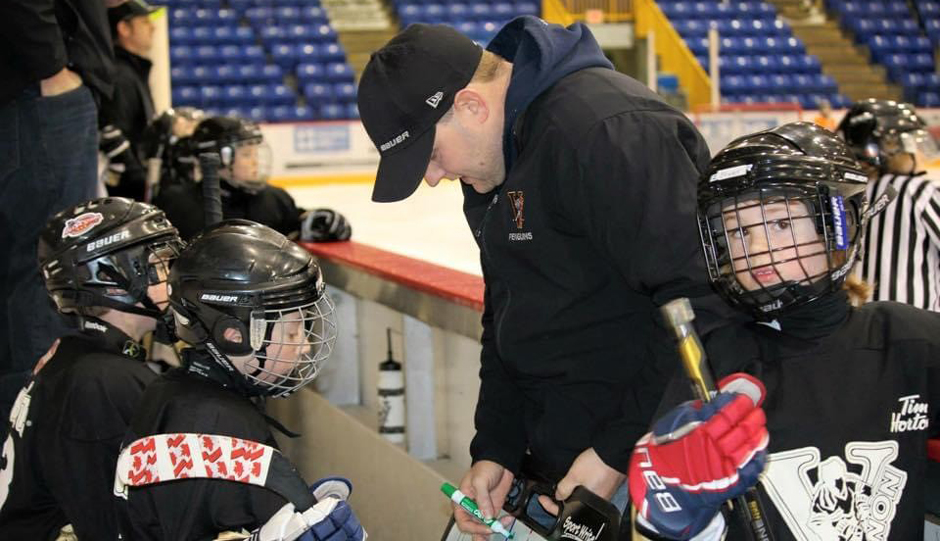
Today, Robertson serves alongside Bathurst as they work to ensure Vernon and Kal Tire Place are ready to host Canada’s Women’s U18 National Club Championship. He’s excited for the girls who will be participating in the tournament and the impact the event will have on the broader community — profits will be going towards the creation of a post-secondary scholarship fund and a grassroots development fund that will support girls’ hockey in the region.
“I'm looking forward to all the kids coming. Hopefully we put a good product out there and they enjoy it because this is one of the biggest tournaments these girls are ever going to play in,” Robertson says. “We are giving back to the community through scholarships, and we have a grassroots program that will help young girls get into hockey that maybe couldn’t afford it. It will help them out with the bills, whether it is hockey equipment or team fees, league fees or whatnot.”
Bathurst says Robertson has been the “flagship volunteer” for girls’ hockey in the Vernon area and that his dedication and commitment to the game is unparalleled.
“You couldn't find a better volunteer and champion of female hockey than Braden,” says Bathurst. “He really is an example for many of us to follow in terms of the growth of the female game.”
At the end of the day, Robertson says giving back to the game he loves so much isn’t just about hockey, it’s about shaping the next generation of adults and having a positive impact early in life.
“It’s about trying to create good human beings, members of society that can move on and work hard,” he says. “It’s about finding out what they are good at. It’s about being a good human being and I think hockey and all sports are that way. Sometimes people lean too much towards the sport itself, but we are raising these young adults that will have to contribute one day.”
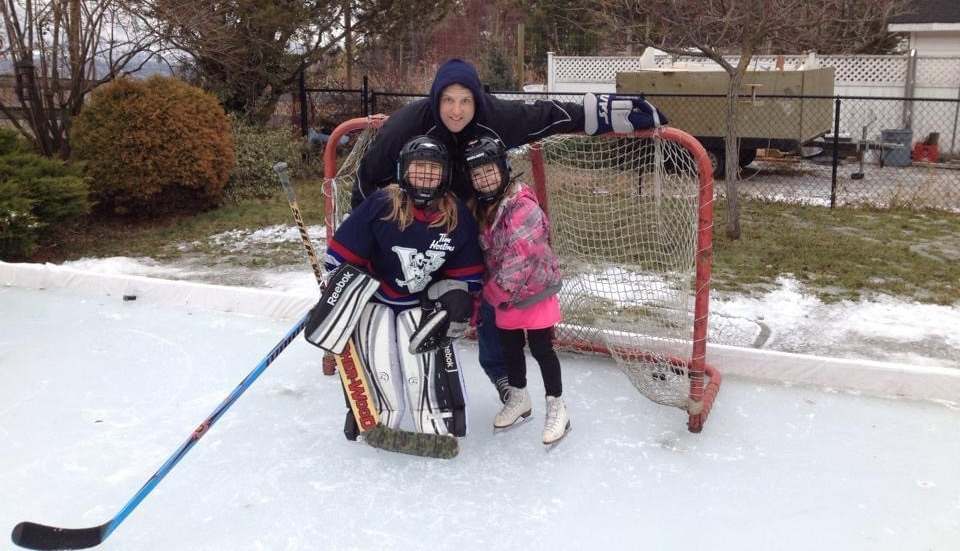
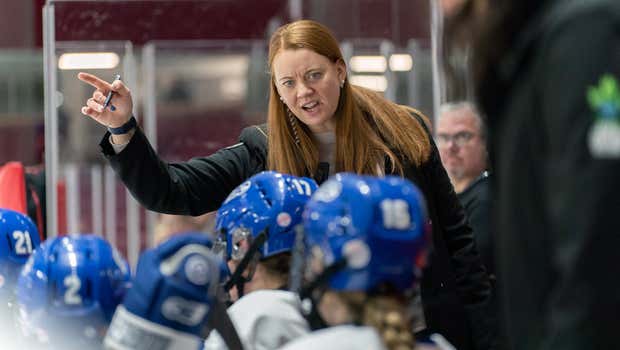
From stage lights to hockey heights
After transitioning from improv acting to coaching high-level hockey, Whitney Juszkiewicz continues to flourish behind the bench
Before the gold medal, the accolades and the countless hours behind the bench coaching high-level hockey, Whitney Juszkiewicz was an improv actor in Vancouver.
“I was on stage every Sunday throwing on an attitude, throwing on an accent, throwing on a persona and going for it,” recalls Juszkiewicz.
Born in Alberta, Juszkiewicz grew up in Edmonton and was deeply involved in hockey, attending St. Francis Xavier High Performance Hockey Academy before enrolling at the University of Saskatchewan, where she studied liberal arts and was a member of the Huskies hockey team. She then studied live performance at Red Deer Polytechnic before embarking on a career in live performance.
“I spent almost eight years in the film, television and theatre industry and I did a lot of stuff in Red Deer,” Juszkiewicz says. “My friends and I then started a theatre company (BullSkit) that specialized in improv and sketch comedy like Saturday Night Live or Second City.”
By 2012, Juszkiewicz was living in Vancouver, running her theatre company, performing improv and providing hockey lessons to kids. It was after one of those lessons that a parent asked if she had ever considered coaching hockey. After thinking it over, Juszkiewicz decided to go for it and soon found herself behind the bench of a Vancouver-area U11 boys’ team.
“I must have done a pretty good job because in my first year I won rookie coach of the year,” she says.
A little more than a decade later, Juszkiewicz is now a respected high-performance hockey coach, having been behind the bench of numerous high-level boys’ and girls’ teams throughout Greater Vancouver, and the owner of Fire and Ice Hockey Development. She has held also held various coaching-related positions with BC Hockey, briefly served as the executive director of the Langley Minor Hockey Association, became a certified Hockey Canada Skills Coach and worked as a female coach mentor with the NHL Coaches’ Association during that time.
“I put the coaching hat on and I haven’t looked back,” says Juszkiewicz, who is also a coach in the B.C. provincial program, an associate coach with a U18 Prep team at the Delta Hockey Academy and head coach of a female U15 AAA team in the Pacific Coast Amateur Hockey Association.
In February, as an assistant coach, Juszkiewicz helped Team BC win its first-ever gold medal in women’s hockey at the 2023 Canada Winter Games.
“It was a privilege to work with those young women, some of whom went on to win gold at the women’s under-18 world championship,” she says. “It was just an unbelievable experience and it will definitely be one of my all-time favourite memories as a coach.”
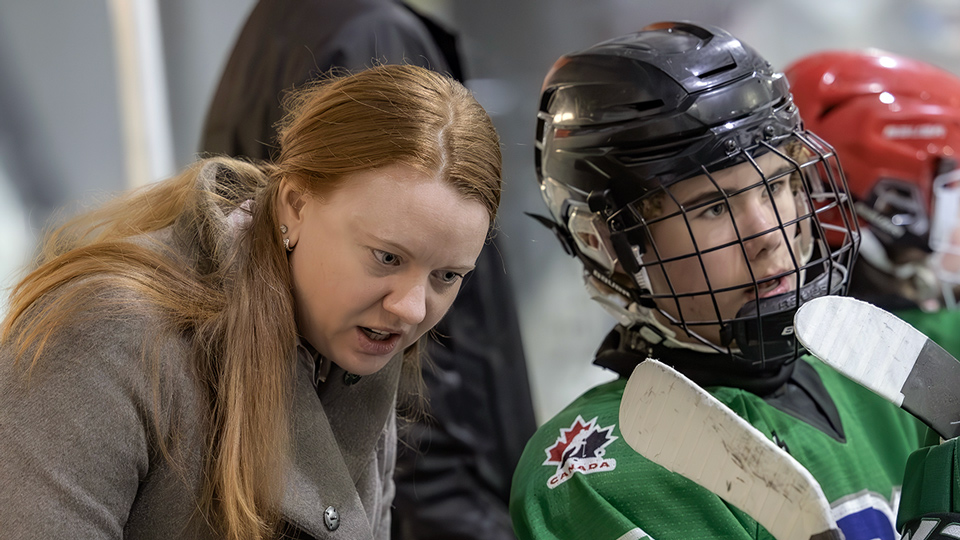
Same skills, different role
Although Juszkiewicz is no longer performing improv on weekends, she has found that many of the skills she developed as an actor have transferred over into the coaching world.
“[Coaching] hockey is reading the room and understanding that this may not be the right time to really drill in the negatives and that everyone needs a little bit of a bump, they need value,” she says.
In the acting world, Juszkiewicz says, a strong emphasis is placed on organization, understanding objectives and having everyone buy into their roles to ensure everything is successful, just like it is in hockey.
“You have the best shows when everybody understands the objective and I find the coaching world is very much like that,” says Juszkiewicz, who continues to dabble in acting, having appeared as an extra in Mighty Ducks: Game Changers. “Everyone's got a job, everyone's got a special talent that they're bringing; there is a reason why they're there and if we can just dig into those specialties and create a nice, inclusive, safe environment, we're going to have a great time.”
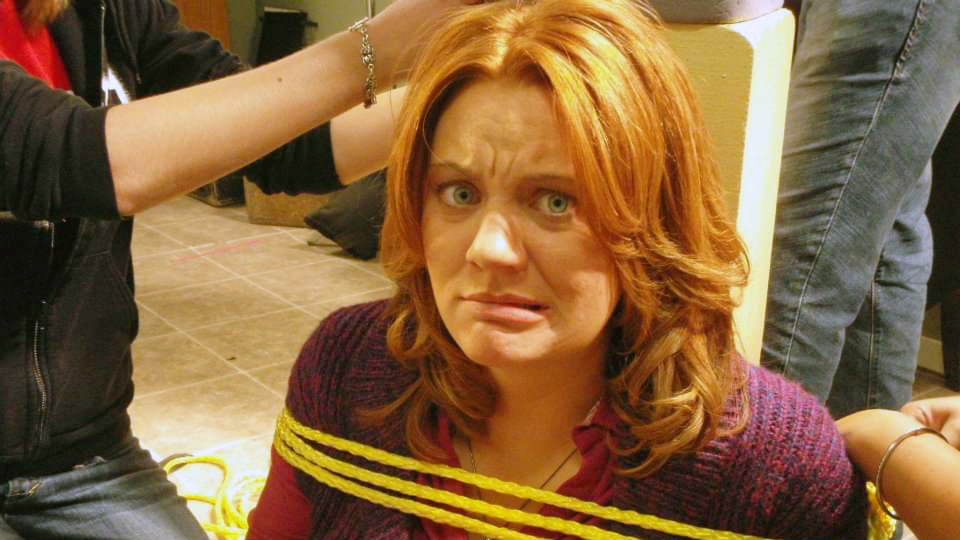
Learning and growing
Over the last four years, Juszkiewicz has been participating in Hockey Canada's Women Master Coach Developer (WMCD) program, an elite initiative that is providing 38 high-performance women’s hockey coaches with the skills they need to deliver clinics and train future facilitators and evaluators as part of an effort to increase the number of women-led coaching programs nationwide.
“It's been able to give me that extra credibility, that extra training and that extra guidance that I find I am now using with all coaches that either I work with or work for me,” Juszkiewicz says about the program, which she is set to complete later this year. “It’s been a wonderful opportunity to understand how to work with people how to train them, how are you going to create a learning environment as opposed to more of a lecture and just listen to what I have to say environment.”
WMCD participants are nominated by Hockey Canada Members and must have completed several certification and training courses to even be considered. One of the biggest benefits of being in WMCD has been connecting with 37 other highly talented women, says Juszkiewicz.
“I am one of the only women in my province in the program. If I didn't have the ability to connect with other girls in other provinces, I would feel pretty lonely and like I was on my own little island. So, I think the best part is that you are getting some of the top minds across the country in terms of female leadership and female hockey getting together and that is very empowering,” she explains. “It's extremely empowering to know that you're not by yourself.”
Juszkiewicz’s hard work and continuous dedication to her craft over the years has paid dividends. In 2021, she was named BFL Female Coach of the Year for British Columbia in the Community category, and in 2022 she was awarded the BC Hockey Development Award for coaching. She says her drive for continuous learning and growth is fueled by her desire to continue coaching in the game she loves.
“If you don't continue pushing yourself to learn and develop, you get stagnant and ultimately you get left behind.”
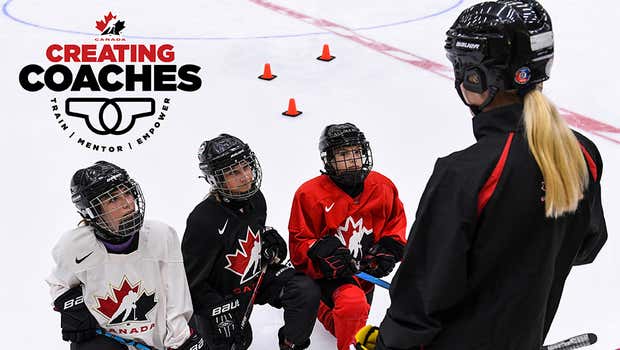
Eight student-athletes to participate in Creating Coaches program
Creating Coaches’ third cohort runs until end of 2024-25 season
CALGARY, AB – Hockey Canada and U SPORTS have announced the eight student-athletes who have been selected to join Creating Coaches, a program designed to increase the number of women coaching hockey in Canada, as part of its third cohort which will run during the 2023-24 and 2024-25 seasons.
Launched in 2021 through a partnership between Hockey Canada, U SPORTS and the Hockey Canada Foundation, Creating Coaches provides training and mentorship to current U SPORTS student-athletes who are concurrently looking to begin their coaching careers. Participants in the program serve as an assistant coach with a U13, U15 or U18 girls’ hockey team for the duration of the two seasons and receive coach education, professional development opportunities and an honorarium.
This year’s cohort includes student-athletes from eight U SPORTS women’s hockey programs across three of its conferences:
• Alexis Anonech (York University, OUA)
• Emmy Fecteau (Concordia University, RSEQ)
• Lyndsey Janes (Mount Royal University, CW)
• Madison Laberge (Nipissing University, OUA)
• Isabelle Lajoie (University of Alberta, CW)
• Sophie Lalor (University of Saskatchewan, CW)
• Sarah-Maude Lavoie (McGill University, RSEQ)
• Chihiro Suzuki (Guelph University, OUA)
“We are thrilled to welcome these eight accomplished student-athletes to Creating Coaches and look forward to working with them during the next two seasons,” said Marin Hickox, Hockey Canada’s vice-president of women and girls’ hockey. “Creating Coaches is an important program to support and develop hockey’s next generation of leaders and we are grateful to the U SPORTS coaches who nominated this talented group.
“Girls who have been coached by a woman are more likely to transition into a coaching role at the end of their playing careers, and it is our intention that this program will positively influence the recruitment and retention of girls and women in leadership roles in the sport.”
Since its inception, Creating Coaches has included student-athletes from 16 U SPORTS women’s hockey programs and all four of its conferences.
“The eight student-athletes selected to join Creating Coaches are tremendous ambassadors for hockey and university sport in Canada,” said Lisette Johnson-Stapley, chief sport officer at U SPORTS. “We have already seen the positive impact that this program has had inspiring young girls in communities across the country and we are excited for Alexis, Chihiro, Emmy, Isabelle, Lyndsey, Madison, Sarah-Maude and Sophie to begin their coaching careers while continuing to represent their universities with pride as student-athletes.”
The Creating Coaches selection committee includes representation from Hockey Canada, U SPORTS, Hockey Canada’s Members and the Hockey Canada Foundation Board of Directors.
During National Coaches Week, Hockey Canada is celebrating the positive impact that coaches have on athletes in communities from coast to coast to coast, with #ThanksCoach resources and features shared here.
To learn more about Hockey Canada, please visit HockeyCanada.ca, or follow along through social media on Facebook, X and Instagram.
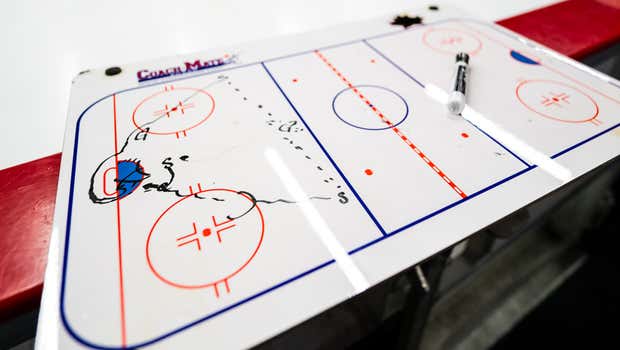
Resources for Canadian coaches
From upcoming training opportunities to ideas for skills and drills, Hockey Canada has a variety of resources available for coaches of all levels across the country
Coaches are the backbone of the hockey community. Whether you are a regular behind the bench or it’s your first season as a coach, Hockey Canada has a variety of resources available to help you succeed on your coaching journey.
How do I start my coaching journey?
If you want to get started coaching, make Hockey Canada’s National Coach Certification Program (NCCP) your first stop. This program enables coaches to build their coaching tools and knowledge of the game to work effectively with their players. Hockey Canada offers six coaching clinics and five instructional stream areas of focus.
Those looking to be trained to coach in the Community Sport stream can participate in Coach 1 — Intro to Coach or Coach 2 — Coach Level. NCCP certification is not required at either of these levels; a coach will remain trained indefinitely after completing these streams. Register for a coaching clinic or visit your Member website for more information.
Respect in Sport
The Respect in Sport Activity Leader/Coach program is an engaging and easy-to-use online training course that helps hockey coaches and youth leaders recognize, understand and respond to issues of bullying, abuse, harassment and discrimination. The course also aims to build a holistic culture of respect within the sports community and provide fundamental training tools to enable all coaches to become even better role models for the young athletes in their care.
In Canadian hockey, more than 230,000 coaches are certified by the Respect Group Inc.
Skills and drills
The Hockey Canada Network gives coaches and players the tools to succeed with drills, skills, videos, practice plans and articles on their tablet or phone. There are over 1,500 drills and more than 100 lesson plans available on the app, with more added throughout the season.
Looking for more drill inspiration? Hockey Canada will frequently post skill videos on its social channels that can be incorporated into practice plans. Search the hashtag #HCSkillsCoach and #HCGoalieCoach on X (formerly known as Twitter), Facebook and Instagram to find more drill videos to utilize on the ice.
Drill Hub is another resource available to find skills and drills for players. It is a free resource for coaches to access hundreds of drills and videos. There are also pre-made practice plans available to download, along with templates for game rosters, player stats, scouting reports and more.
Women in coaching
We Are Coaches
As a free, women-only coach program, We Are Coaches was designed to increase the number of trained women coaches in Canada in order to provide mentors and role models for young participants. The program aims to build infrastructure to support and sustain the participation of girls and women in hockey in Canada, develop women role models and leaders within the hockey community and remove barriers to coaching education for women.
Women Master Coach Developer
Launched in 2019, the Women Master Coach Developer (WMCD) program introduces more hockey coaching programs led by women. The program has equipped 38 coach leaders to not only deliver coach clinics, but also train future facilitators and evaluators in each Member.
To participate in the program, delegates can be nominated by their Member each season. Delegates are required to complete multiple trainings and certifications in the program, and upon successful completion, they will take a leadership role to optimize the delivery of the We Are Coaches program and support women coaches within their communities.
Creating Coaches
In 2021, the Hockey Canada Foundation partnered with U SPORTS to launch Creating Coaches, a program designed to increase the number of women in coaching positions in Canada. This two-year mentorship program places a focus on training, mentoring and empowering women behind the bench.
Candidates for the program are nominated by their U SPORTS coaches to participate in Creating Coaches.
How do I get further coaching support?
Are you looking for more support? Do you have a question about coaching in your community? Hockey Canada and its Members have coaching resources and helpful staff available to help you on your coaching journey.
Click here to find the coaching contact information for your Member.
Do you have more questions about coaching? Visit these Frequently Asked Questions pages to learn more about the following topics:
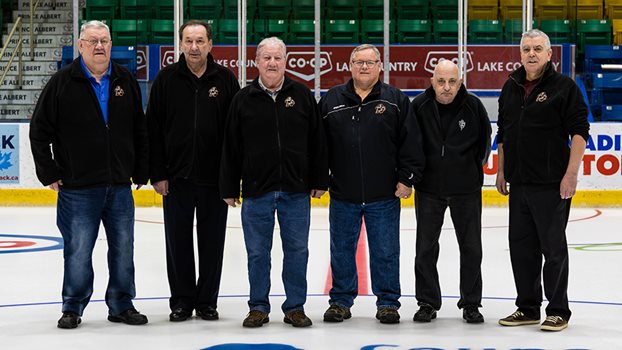
Volunteering as friends
It was friendship that inspired a group to begin volunteering as off-ice officials, and the Prince Albert hockey community is grateful for their dedication each year
There’s nothing better than volunteering with friends.
It was friendship that inspired Garry Schwan to get involved in off-ice officiating in Prince Albert, Sask., just over a decade ago.
“A friend of mine was running the clock and they never seem to have anybody that wanted to work in the penalty box,” Schwan says. “So, I started working and then kept going [after my friend stopped volunteering.]”
This group of mostly retired friends is now the backbone for off-ice officiating in Prince Albert, with some volunteering in minor hockey for almost 30 years, like Lloyd McBeath. You can find this dedicated crew volunteering for all the Prince Albert Raiders, Prince Albert Mintos and Prince Albert Bears games.
“I just liked the sport and getting involved,” McBeath says. “I enjoy the company with everyone.”
Since this crew has been working with the Prince Albert Bears for multiple seasons, the team was asked to volunteer at the upcoming Esso Cup and agreed to be there for all 19 tournament games.
“It’s fun to watch,” volunteer Dwight Sachkowski says about watching the Bears. “It is good hockey. The team that’s representing the province is Regina this year. They’ve got an awesome team. They’re going to be tough to beat.”
Another perk to volunteering with friends? Sharing laughter and making memories during every game together.
“We have a lot of fun bugging each other. We get along really well,” Sachkowski says.
“We do a lot of joking around during the games,” adds McBeath. “It's enjoyable.”
“We buy our 50/50 tickets,” Schwan says. “We’ve never won, but we’ve been buying them every game.”
The dedication of these volunteers has not gone without notice in the Prince Albert community. The host committee for the 2023 Esso Cup has expressed its gratitude for having such an eager group willing to volunteer their time for the tournament in addition to their work all season long.
“The girls and the management directors, they appreciate it,” Schwan says. “We get invited to their banquets every year. They’ve treated us pretty good.”
Volunteerism is the backbone of minor hockey, and if you’re looking to be a part of minor hockey, Sachkowski has some advice.
“Get involved,” he says. “It’s as simple as that.”
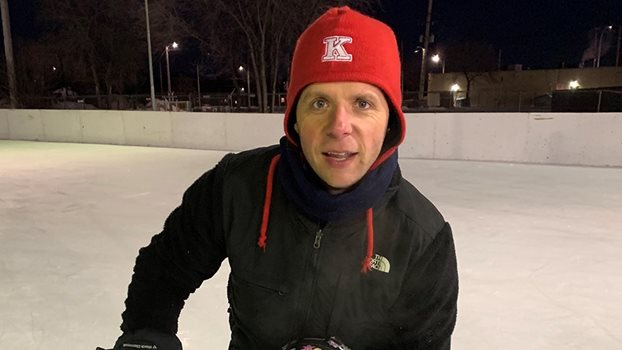
For the love of the game, for the love of community
A hockey dad and tireless contributor to community sports in Winnipeg as a coach and so much more, Steve Wach puts the focus on finding a balance between getting better and having fun
Coaching youth sports takes time, effort, patience, the ability to develop and foster relationships, and so much more.
Steve Wach has all of those attributes. Wach is a father of three in Winnipeg and president of the Corydon Community Centre. He oversees U7 and U9 programs at the centre and, during the 2022-23 season, coached three teams – as head coach of U7 and U9 teams, and an assistant coach on a U11 team.
Busy? You bet, but Wach wouldn’t have it any other way. He’s proud to be able to witness, firsthand, the tremendous impact community involvement has on kids in the Manitoba capital.
“We’re very fortunate to live in an area that has a rink. We have a rink that’s over 60 years old in our community centre and it is the central hub of the community,” says Wach. “We run a lot of programming out of there with a lot of kids involved with all sorts of skill levels. Some kids are striving to become as good as they possibly can be, while some kids and parents are at the stage of ‘Let’s give hockey a shot.’ There’s a great community aspect to it and we get a lot of people involved who either wouldn’t have traditionally been involved in hockey or wouldn’t have been that interested.
“We’ve been successful in getting a big volunteer base, so it does have excellent community feel, with family and friends who do it.”
Wach has a pretty typical Canadian story, having played minor hockey through the A, AA and AAA ranks, while also playing for his high school team. He continues to get on the ice with friends in a local league.
He and wife Chrissy have three kids – nine-year-old Edward, eight-year-old Matthew and six-year-old Anna. All three play hockey, along with other sports including baseball and soccer.
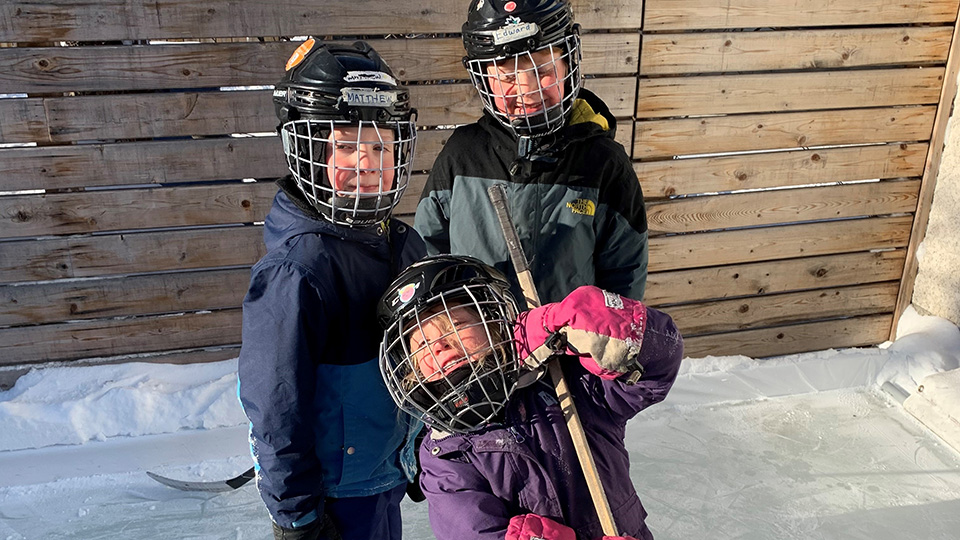
Wach got involved in coaching hockey as an assistant with Edward’s U7 team a few years ago and, since then, has taken on a variety of roles on teams, including head and assistant coach, but also overseeing hockey programming for the community centre and trying to get more volunteers to take on the many roles that are needed to put on successful sports seasons.
Any coach will tell you they have their beliefs and philosophies, and Wach strikes a balance between a focus on technical skills and ensuring the name of the game – FUN – are both attained.
“One of the most important things we try to bring forward, we can be very competitive without being overly serious about it,” Wach says. “We can come out and teach the kids to work hard, build towards something, take that long view, build up the team effort and compete to play as hard as you can and have as much fun as you can but to do that without being serious about it. When I say serious, you’re doing it to be the best you can but you’re doing it realizing what it is – and it’s still minor hockey and it’s still seven-, eight-, nine-year-olds.”
Wach is quick to continuously point out that many in the Corydon community contribute to the success of the hockey programming offered there; he is perhaps most proud of the fact that many new families to hockey – and many new families to Canada – are given the opportunity to have get their kids in the game.
He also notes that he isn’t the best coach in the family, with that title going to Chrissy, whose background playing collegiate soccer in the United States led her to become a physical education teacher who also coaches a variety of high school sports – track and field, badminton and volleyball, just to name a few.
Between their parents, the Wach kids are in good hands, as are the countless minor hockey players and athletes in their part of Winnipeg.
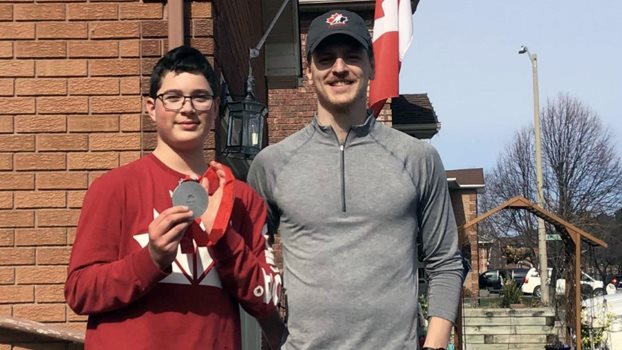
Crane finds friendship as Big Brothers Big Sisters volunteer
After quitting his full-time job to focus on Canada's National Para Hockey Team, Rod Crane filled his free time by giving back to his community
When Rod Crane received word that he made Canada's National Para Hockey Team, he knew his life would change. He just wasn’t sure how.
The Clarksburg, Ont., native knew his hockey career was about to take off, but when he quit his job to focus full-time on training for the national team in 2018-19, he found an abundance of time in his calendar. After mulling over various ideas, his mother, Christine, mentioned the Big Brothers Big Sisters of Barrie & District.
"I had been looking for a volunteer gig to help me pass the time and keep busy, and she was the one who first brought it up," says Crane, who won a silver medal at the 2022 Paralympic Winter Games. "She thought it would be a good fit, so I looked into it and got matched with a great family."
For more than a century, Big Brothers Big Sisters has been championing the health and well-being of youth, ensuring children are supported by caring adults — helping them physically, mentally, socially, emotionally and academically. This year alone, the organization has impacted over 41,000 youth in over 1,100 communities across Canada.
After going through the application process, Crane was matched with a fifth-grader named Sandro, and the two became fast friends.
"He's such a funny kid," says Crane, a defenceman who began his para hockey career in 2014 with the Elmvale Bears. "Sandro is so smart, very driven, enjoys school, speaks three languages and is just a happy-go-lucky kid. He's not as much into sports, but he's into movies, Lego and things like that; he's a blast to be around."
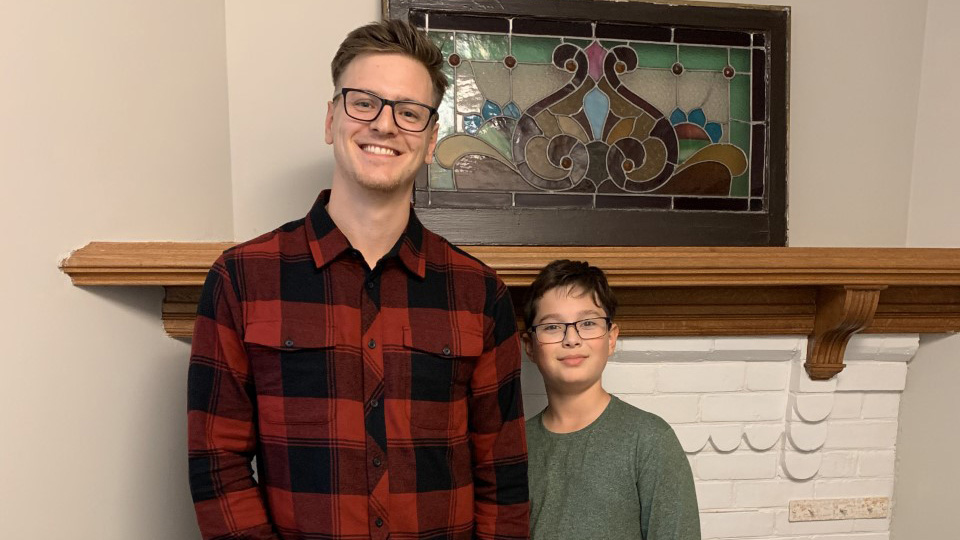
As part of the program, Crane and Sandro get together a couple of times a month, and their interactions can be as competitive as going bowling or as simple as just grabbing a bite to eat.
“It’s nice to have Rod in my life,” says Sandro. “I look up to him, he’s a great guy. We text back and forth and go do things together. It’s pretty cool to be friends.”
Considering he went into this adventure without any prior knowledge, Crane is happy with the way the relationship has evolved.
"I didn't know what I was getting into. My only idea of Big Brothers [Big] Sisters came from an episode of The Simpsons," says Crane with a chuckle. "Not only is it nice to give back to the community, but I love watching him grow. He has really come out of his shell and become his own individual."
Three years on and despite not being much of a sports fan, Sandro and Crane have become fast friends. Sandro, who is now in Grade 8, has taken a liking to the National Para Hockey Team, following it wherever it goes, including watching the 2022 Paralympics in Beijing.
“Knowing someone on the ice is a cool feeling,” Sandro added. “I’ve gone to watch Rod live a few times and now that I know what it is, I think para hockey is super entertaining. After games, I try and text him and congratulate him, but I make sure I don’t critique him too hard.”
Although it’s just an organizational name, Crane feels the Big Brothers Big Sisters program is comparable to having your own siblings.
"[Sandro] knows I'm here to talk and for him when he needs it,” says Crane. “He's in Grade 8 and just learning how to communicate, so sometimes he takes advantage of that opportunity to open up, but other times it's as simple as just a check-in text message where he asks if I'm good and vice versa. I take a lot of pride in being there for him, and I think it gives his mom some peace of mind as a single parent that he has a strong male influence in his life."
Sandro will soon have another major tournament to keep tabs on as Crane and his Canadian teammates are preparing to host the World Para Hockey Championship beginning May 31 in Moose Jaw, Sask.
"I've made a friend for life," adds Crane. He knows I am here to support him in whatever he's doing, and I know I have a fan at home cheering for me."
For more information: |
- <
- >

